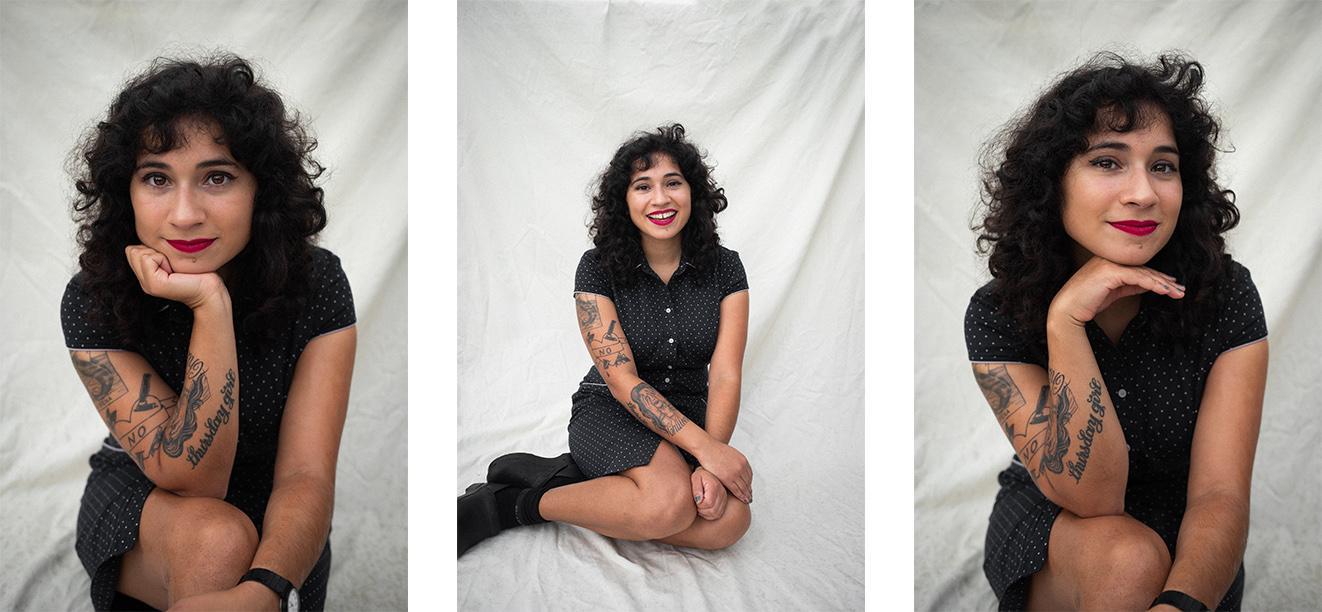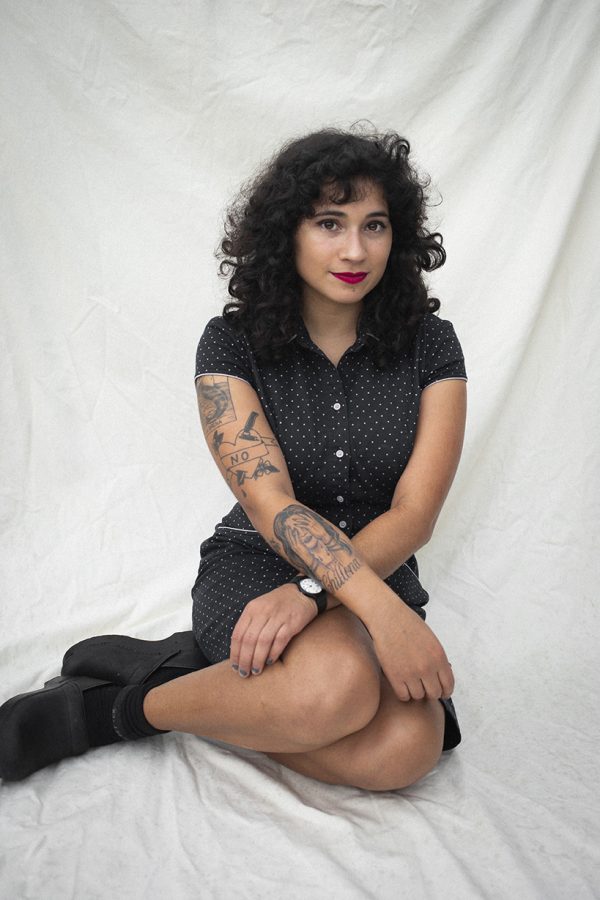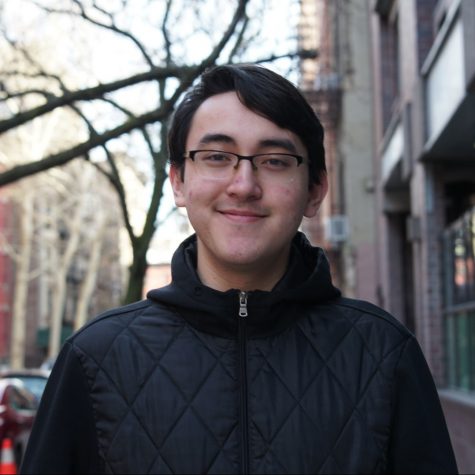Poet and performer Melissa Lozada-Oliva has never known how to keep her own secrets.
“I have a deep need to confess things,” she said. “A big part of being a performance poet, for me, is sharing stuff on stage in front of strangers.”
The 26-year-old native of Newton, Massachusetts came to New York last year to pursue a master’s in creative writing at NYU, but before that, she was already at the top of the slam poetry world.
The first time Lozada-Oliva ever saw slam was when she watched a video on YouTube of a performance by the slam poet Taylor Mali, while Lozada-Oliva was an undergraduate student at Simmons College. She recalls having an immediate, visceral reaction. The idea of sharing a part of herself like that, of telling a story while working within the rules and constraints of slam, thrilled her.
“I was like ‘I have stories, I have stories to tell,’ and I’m excited by this form I get to put it in,” she said.
Her experience growing up as a Latina kid in an immigrant family in Newton, a mostly-white, relatively affluent suburb of Boston, was a major influence on her work. Her parents met in an English as a Second Language class after immigrating to the United States — her mother from Guatemala, her father from Colombia.
“As a Latina woman, I experience so much shame focused on what I look like,” she said. “I wanted to honor shame, maybe, or understand it better, so I could feel it less.”
Writing and performing offered her an outlet for that shame.
Writing started as a way to channel her anxieties. From the ages of eight to 18, she kept a meticulous log of everything she did. Over those years, language had a profound effect on Lozada-Oliva.
“That really intense, neurotic, maybe bad habit developed into a skill where I had control over language,” she said. “I really had access to it in a way that made me feel powerful.”
Not long after watching that first video, Lozada-Oliva joined her school’s slam poetry team. As she recited her work at slam competitions, it quickly became clear how gifted a writer and performer she was.
Slam emphasizes poetry as a spoken form, an exercise in the beauty of sound rather than the beauty of the written word; it’s written to be performed for others, usually in the context of a competition. Being read aloud can inject new life into words that don’t necessarily make an impression on the page. But Lozada-Oliva’s work, perhaps unusually, is just as powerful when read silently as when she performed aloud.
If anything, it seems like performing her work transforms Lozada-Oliva instead of the reverse. In person, she’s friendly, warm and approachable but also a little tentative. In performance, she commands attention, spitting words forcefully and unapologetically. It’s no wonder then that she was part of the team that won the National Poetry Slam competition in 2015.
“[Slam poetry] allowed me to find these really deep stories in me I wanted to tell, but also the way that slam is set up, I felt like I was ‘winning,’” she said.
That feeling of victory came when she was able to use the performance as a way to lay bare her past traumas for others to see.
“As a feminine person and as a woman, it felt like you would only pay attention to me when something bad had happened to me, and I couldn’t just be a poet or tell a funny story,” she said. “Now I’m trying to lean into how much I love storytelling and how much I love humor.”
She soon transitioned into performing independently, which continues to be a significant part of her artistic practice.
“I’m inherently a very performative person,” she said. “I like specifically what I can get across [to] people in that way. I like the connection of performance.”
In 2016, Lozada-Oliva was living in Boston, working at a bookstore and spending every free moment she had writing and performing. The previous year, she had published her first chapbook, “Plastic Pajaros” (Pizza Pi Press), and in 2016, she published her second, “Rude Girl is Lonely Girl” (Pizza Pi Press), inspired by her love of the titular character of the Netflix series, “Jessica Jones.”
After seeing one of her performances, Lozada-Oliva was approached by a representative of publisher Button Poetry who proposed that she publish a book with them. While writing what would become her first full collection, “Peluda,” Lozada-Oliva also applied, and was accepted, for an MFA in Creative Writing at NYU.
“Peluda” was published during her first semester, in fall 2017. The title translates to “hairy” or “hairy beast,” a reference to her complicated relationship with her body hair. Her mother worked as a waxer, and hair and hair removal is a motif that permeates the book.
“The way hair removal related to my identity as a Latina, as a woman, and feminism and all of these things I was grappling with and trying to understand,” she said. “Do I wax my mustache because it’s something my mom taught me how to do and it’s a way she showed me love? But why is that a way she showed me love? Why was the only thing she was able to do was become a beautician, as a poor immigrant?”
“I wrote a book as an ode to her, basically,” she said.

She chose NYU’s MFA — the only program she applied to — partly because she wanted to be in New York, the center of the country’s publishing industry. But the clincher was the program’s faculty, including poets she admires like Terrance Hayes, Sharon Olds and Anne Carson, all of whom she got the chance to study with during her first year.
But she wants to make it clear that an MFA is not a requirement for being a writer.
“I don’t think anyone needs to do the MFA,” she said. “But I think I’m a better writer, mostly because I’m a better reader now.”
When it comes to where she draws ideas, influence and inspiration, Lozada-Oliva is generous in crediting not only her family but also her fellow artists, friends and peers.
“I just love sad, spectral women, sad, ephemeral ladies,” Lozada-Oliva said, citing writers and creators as varied as Matthea Harvey, Kelly Link and Jamie Loftus.
She has a particular admiration for filmmaker, writer and artist Miranda July.
“I love how she talks about loneliness and love and connection,” she said.
Singer-songwriter Mitski is another singular influence on her and her work.
“The way she specifically talks about longing and desire and wanting to be kissed,” she said, showing me a tattoo on her arm of the title of one of Mitski’s songs, “Thursday Girl.” “So many people are listening to this thinking, about shitty dudes, but it’s not about them. It’s about the magic of wanting someone.”
She also cites an idea from her friend, poet Crystal Valentine, an NYU MFA alumna, as influencing the way she thinks about art and relatability.
“I don’t want you to relate to this story. I just want you to understand that I’m also a person, and I want you to empathize with this knowing that you can’t see yourself in this at all,” she said.
Hanif Abdurraqib is a poet and music writer based in Columbus, Ohio who worked with Lozada-Oliva as the editor for “Peluda.”
“I think there’s something really unique [about it],” he said. “It’s interesting and playful, while still grappling with really serious topics like family and the body and grief and loss and love, and I think there’s something really easy to connect with.”
As a Latina woman writing, or even just existing, in America in 2018, President Donald Trump is an unavoidable presence for Lozada-Oliva. Even if she doesn’t write directly about him, other people often ask her what it’s like to live in the U.S. today as the child of immigrants from Latin America.
“I appreciate the notion of looking toward a Latina writer.” she said. “‘Yes, we just understand. We’ve understood this for a while, and you haven’t,’” she said, addressing an imagined white audience.
She doesn’t dispute the value in telling untold stories or the healing power of sharing one’s pain, as evidenced by her own work. But she’s also not afraid to challenge the idea that she should be expected to either.
“I think the expectation of me only having to meditate on my trauma and the traumas the world causes me is unfair, and so I really push against that,” she said.
At this moment in time and space, her current work leans more toward being “satirical and dark because that’s what I’m feeling. I think it’s more truthful to me.”
“I’m leaning away from sentimentality because it doesn’t feel useful,” she said. “You’re idealistically looking for hope and joy, for someone to tell you it’s OK, and what if it’s not? It’s currently not OK. What are we going to do about that?”
Tiffany Mallery, a Boston-based illustrator and frequent collaborator of Lozada-Oliva’s who illustrated the covers of her chapbooks and collection, loves her work for its levity in the face of pain.
“She’s just really funny, and that’s such a unique part of her poetry. It can be really tender and serious,” she said. “But there’s a really genuine sense of humor that comes across.”
Mallery also praised the steady sense of hope that pervades Lozada-Olivia’s work.
“Even if it’s a poem about something painful,” she said, “there’s still moments where you see this light come through.”
A version of this article appeared in the Thursday, Oct. 11 Arts Issue on pages 10-11. Read more from the Arts Issue here. Email Alex Cullina at [email protected].
























































































































































